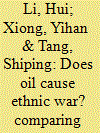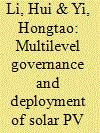|
|
|
Sort Order |
|
|
|
Items / Page
|
|
|
|
|
|
|
| Srl | Item |
| 1 |
ID:
153174


|
|
|
|
|
| Summary/Abstract |
This article contributes both empirically and methodologically. Empirically, we seek to advance our understanding of an important puzzle: does oil cause ethnic war? Methodologically, we seek to identify more precisely the different weaknesses and strengths of the quantitative approach and case studies with process-tracing by explicitly comparing results from these two approaches on the same empirical question. We thus subject the statistical association between the ethnogeographical location of oil and the onset of ethnic war to test with process-tracing. Examining several pathway cases, we find that oil has rarely been a deep cause of ethnic war. Instead, the ethnogeographical location of oil either reignites dormant conflict that has deeper roots in ethnic resentment and hatred or intensifies ongoing conflict, mostly by facilitating the operation of two interconnected mechanisms. Our study echoes the notion that quantitative exercises alone often cannot establish specific causal mechanisms or how contextual factors impact the operation of these mechanisms, and it is precisely on these two key fronts that qualitative exercises possess critical advantages. Hence, quantitative methods and qualitative methods are complementary rather than competitive. Our study also yields important policy implications for preventing and managing ethnic conflict in countries with rich mineral resource.
|
|
|
|
|
|
|
|
|
|
|
|
|
|
|
|
| 2 |
ID:
185575


|
|
|
|
|
| Summary/Abstract |
China's ascendancy as a global development actor has significant implications for geostrategic dynamics and international development. While the push to ‘go out’ has been seen as a major strategy of the Chinese state, the actors are increasingly diversifying, including Chinese state agencies, businesses and non-governmental organizations (NGOs). We analyse the inconspicuous but important involvement of international NGOs (INGOs) in China's globalizing strategy. Drawing on in-depth interviews, we develop an integrated framework for INGOs as intermediaries in China's ‘going out’ strategy, based on the content of intermediary support (tangible vs intangible resources) and the function of the intermediary (bridging vs initiating). These intermediary roles have implications for how INGOs navigate conflicts between their domestic work in China and their outbound efforts, INGO legitimacy as actors that promote global norms or as ambassadors of the party-state, and the extent to which they facilitate Chinese expansion and soft power or shape China's global engagement. We show how INGOs as northern actors continue to play a role in South–South Cooperation. Our findings shed light on how global civil society chooses to invest its significant material and discursive resources, and how global actors under authoritarianism internalize, resist or promote its projects.
|
|
|
|
|
|
|
|
|
|
|
|
|
|
|
|
| 3 |
ID:
169963


|
|
|
|
|
| Summary/Abstract |
This study tries to determine to what extent the Chinese bureaucracy is merit-based. By triangulating quantitative and qualitative survey data from a sample of Chinese cadres (n=286), the authors aim to answer the research question: ‘What is the behavioral impact of the incentive structure the cadre management system helps to shape, and does the incentive matrix support a meritocratic work environment?’. The findings demonstrate that the promotion of local leading cadres is primarily based on their superiors’ recognition and appreciation. A principal-component analysis reveals that what impresses the superiors includes both patronage and merit factors, although patronage has a slight edge over merit. This study also suggests that good interpersonal skills are essential for both merit- and patronage-oriented career advancement.
|
|
|
|
|
|
|
|
|
|
|
|
|
|
|
|
| 4 |
ID:
132639


|
|
|
|
|
| Publication |
2014.
|
| Summary/Abstract |
Solar photovoltaic (PV) installations have been growing rapidly in the United States over the last few years, incentivized by policies from federal, state and local governments. The complex relationships between solar policies at multiple levels of government and solar deployment are questions of importance to policy makers and scholars. Extant literature on solar policies pays less attention to the role of local governments and policies than to their federal and state counterparts. Local governments and policies play indispensable roles in the deployment of solar PVs. This paper studies the multilevel governance of solar development in the U.S. by evaluating the relative effectiveness of state and local policy tools in stimulating solar PV installations, with an emphasis on local solar policies. With a regression analysis on a national sample of 186 U.S. cities, we find that cities with local financial incentives deploy 69% more solar PV capacities than cities without such policies. We also find that cities subject to RPS requirements have 295% more solar PV capacity, compared with cities not regulated by state RPS.
|
|
|
|
|
|
|
|
|
|
|
|
|
|
|
|
|
|
|
|
|